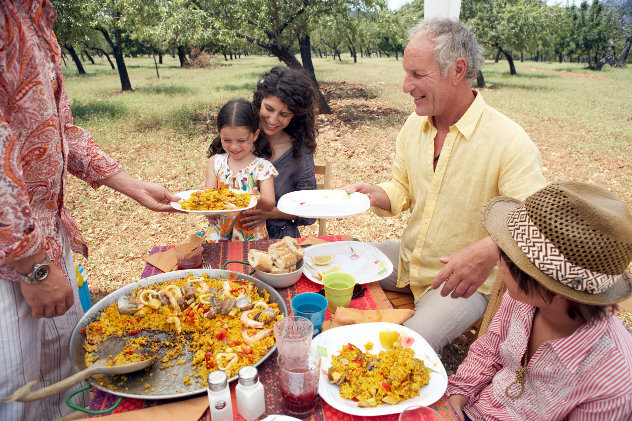Living in Spain, Cultural Insights, and Spanish Life
Annelies Vermeulen, Sunday, 24 December 2023

Moving to Spain offers an enriching experience, particularly when you immerse yourself in local customs and peculiarities. Understanding these cultural nuances not only enhances your own experience but is also deeply appreciated by the locals, especially when you make an effort to speak their language, even if it's just basic phrases.
Spaniards and Their Eating Habits
What captivated me most about Spain was its unique food culture. Meals are typically later than what many are accustomed to, focusing on communal enjoyment. I recall a Sunday lunch at a friend's house that began at 2:00 PM and stretched well into the evening. The array of tapas and paella, with everyone contributing a dish, created a warm, communal atmosphere. However, be mindful that in Spanish culture, it's often considered impolite to refuse food. In restaurants, lunch isn't just a meal; it's an event, often spanning several hours. Adapting to the five fixed meal times—Desayuno, Almuerzo, Comida, Merienda, and Cena—was initially a surprise but quickly became a cherished routine.
Rethinking the Misconception of 'Laziness'
It's a common misconception that Spaniards are lazy. My experience taught me that this is far from the truth. Their lifestyle prioritizes different values, and the warm climate influences daily routines. During the hottest part of the day, activities often slow down, reminiscent of tropical schedules in other countries.
Navigating Spanish Bureaucracy
Dealing with bureaucracy in Spain can be challenging. Patience is crucial, and having a local guide who understands the system can be invaluable. My numerous visits to government offices were made significantly smoother with the help of a Spanish friend.
Approaching Sensitive Topics
It's important to approach certain topics with sensitivity. The Spanish people are proud of their country and often prefer to focus on the present and future rather than the past. For instance, avoiding discussions about the civil war or Franco can be wise, especially during social gatherings.
Understanding Time and Punctuality
The concept of punctuality in Spain is more flexible than in many other cultures, both in social and business contexts. Adapting to this relaxed attitude towards time was initially challenging but ultimately refreshing.
'Mañana, Mañana'
This phrase, meaning 'tomorrow,' is often associated with procrastination. While clear agreements are important, expect a degree of flexibility. In practice, 'mañana' may not always literally mean the next day.
Mobile Communication
The use of mobile phones is widespread in Spain, and initially, I was taken aback by the volume of public conversations. However, this is simply a facet of the vibrant Spanish communication style. Noise Levels
Be prepared for varying standards of noise, especially during busy periods like summer or Easter. The lively atmosphere along the coast is an integral part of Spanish culture.
The Essence of Spanish Life
Despite certain challenges, life in Spain is deeply rooted in pleasure, social connections, and family ties. The warmth and hospitality of the Spanish people are truly remarkable. Once you are welcomed into their community, it feels like a lifelong inclusion. This was exemplified when I was invited to a family celebration and immediately felt a sense of belonging.

Moving to Spain offers an enriching experience, particularly when you immerse yourself in local customs and peculiarities. Understanding these cultural nuances not only enhances your own experience but is also deeply appreciated by the locals, especially when you make an effort to speak their language, even if it's just basic phrases.
Spaniards and Their Eating Habits
What captivated me most about Spain was its unique food culture. Meals are typically later than what many are accustomed to, focusing on communal enjoyment. I recall a Sunday lunch at a friend's house that began at 2:00 PM and stretched well into the evening. The array of tapas and paella, with everyone contributing a dish, created a warm, communal atmosphere. However, be mindful that in Spanish culture, it's often considered impolite to refuse food. In restaurants, lunch isn't just a meal; it's an event, often spanning several hours. Adapting to the five fixed meal times—Desayuno, Almuerzo, Comida, Merienda, and Cena—was initially a surprise but quickly became a cherished routine.
Rethinking the Misconception of 'Laziness'
It's a common misconception that Spaniards are lazy. My experience taught me that this is far from the truth. Their lifestyle prioritizes different values, and the warm climate influences daily routines. During the hottest part of the day, activities often slow down, reminiscent of tropical schedules in other countries.
Navigating Spanish Bureaucracy
Dealing with bureaucracy in Spain can be challenging. Patience is crucial, and having a local guide who understands the system can be invaluable. My numerous visits to government offices were made significantly smoother with the help of a Spanish friend.
Approaching Sensitive Topics
It's important to approach certain topics with sensitivity. The Spanish people are proud of their country and often prefer to focus on the present and future rather than the past. For instance, avoiding discussions about the civil war or Franco can be wise, especially during social gatherings.
Understanding Time and Punctuality
The concept of punctuality in Spain is more flexible than in many other cultures, both in social and business contexts. Adapting to this relaxed attitude towards time was initially challenging but ultimately refreshing.
'Mañana, Mañana'
This phrase, meaning 'tomorrow,' is often associated with procrastination. While clear agreements are important, expect a degree of flexibility. In practice, 'mañana' may not always literally mean the next day.
Mobile Communication
The use of mobile phones is widespread in Spain, and initially, I was taken aback by the volume of public conversations. However, this is simply a facet of the vibrant Spanish communication style. Noise Levels
Be prepared for varying standards of noise, especially during busy periods like summer or Easter. The lively atmosphere along the coast is an integral part of Spanish culture.
The Essence of Spanish Life
Despite certain challenges, life in Spain is deeply rooted in pleasure, social connections, and family ties. The warmth and hospitality of the Spanish people are truly remarkable. Once you are welcomed into their community, it feels like a lifelong inclusion. This was exemplified when I was invited to a family celebration and immediately felt a sense of belonging.

Spanish property for sale. Appartements, villas and housesfor sale in Spain Costa del Sol, Costa Brava and Costa Blanca. For sale by owner and by agent.
 Explore the essentials of making a down payment when buying property in Spain. Our guide covers the importance, amount, and conditions for down
payments, ensuring a secure and informed property purchase. Learn about negotiation, legalities, and safeguarding your investment in Spain's property
market.
Explore the essentials of making a down payment when buying property in Spain. Our guide covers the importance, amount, and conditions for down
payments, ensuring a secure and informed property purchase. Learn about negotiation, legalities, and safeguarding your investment in Spain's property
market.